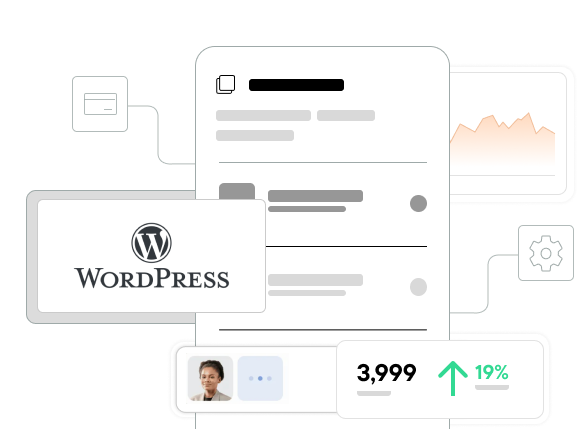Modern B2B SaaS marketing is about more than landing pages and blog posts. It’s about delivering high-impact, measurable experiences that guide prospects through complex buyer journeys—across multiple touchpoints and personas.
Yet amid the tools for automation, CRM, and analytics, one essential asset is often undervalued: the content management system (CMS).
This article presents the business case for WordPress in B2B SaaS marketing—why it’s not just a blog engine, but a strategic platform that enables your marketing team to scale content, personalize UX, and integrate seamlessly with your MarTech stack. Especially when paired with orchestration tools like Sitebox.
What Is WordPress and Why Use It in SaaS Marketing?
WordPress is the world’s most widely used CMS—powering over 40% of the internet. As an open-source platform, it offers marketers and developers the flexibility to create, manage, and optimize content across every stage of the funnel.
Why WordPress Appeals to B2B SaaS Teams:
- Full control: No vendor lock-in or feature limitations.
- Content-first: Built-in SEO, blog, and media handling.
- Scalable architecture: From startups to enterprise SaaS.
- Cost efficiency: No seat-based pricing or platform tax.
Using WordPress in B2B SaaS marketing provides a foundation that grows with your company—from MVP websites to global content hubs.
Beyond Blogging: What WordPress Powers in SaaS
WordPress is often misunderstood as “just for blogging.” In reality, it supports:
🔹 Marketing sites and dynamic landing pages
🔹 Lead-gen content like whitepapers and gated PDFs
🔹 Product update hubs and changelogs
🔹 Microsites for ABM, verticals, or event campaigns
With tools like ACF (Advanced Custom Fields) and custom post types, content is structured, scalable, and marketer-friendly.
Scaling WordPress in B2B SaaS Marketing
As your SaaS product and team grow, your CMS needs to keep up.
WordPress Scales via:
- Multisite setup: Manage multiple brands or regions under one roof
- Custom post types: For webinars, docs, features, and use cases
- Multilingual plugins: Like WPML or Polylang for global campaigns
- Headless setup: Deliver content via API to apps, frontends, and more
This adaptability makes WordPress in B2B SaaS marketing an ideal long-term solution.
Seamless MarTech Integration
Your marketing stack likely includes platforms like:
- HubSpot or Salesforce for CRM
- Segment or Google Analytics for tracking
- CDPs and personalization engines
WordPress integrates with these tools via:
- Prebuilt plugins
- Webhooks
- Custom endpoints via its REST API
Example: Send Form Data to Your CRM
add_action('wp_footer', function () {
if (is_page('pricing')) {
?>
<script>
document.querySelector('#contact-form').addEventListener('submit', () => {
gtag('event', 'conversion', {
'send_to': 'AW-XXXXXX/abc123'
});
});
</script>
<?php
}
});Personalization with WordPress
You can personalize your site based on:
- 🌍 Visitor location
- 💡 Referral source (ads, social, email)
- 📊 User behavior and session history
With ACF and conditional logic, content can dynamically adapt. Combine with CDPs or Sitebox for advanced rules.
Performance and Security at Scale
Enterprise teams often wonder: “Is WordPress secure enough?”
Yes—when configured properly.
Enterprise-Ready Setup:
- 🔐 SSO and role-based access control
- 🧰 Managed hosting with WAF, CDN, and autoscaling
- 🧩 Plugin audits and update policies
- 🚀 Speed optimization (caching, lazy loading, CDN)
Sitebox enhances this with built-in performance monitoring and permission governance—ideal for teams with multiple contributors.
Custom Development for SaaS Use Cases
Create a Custom REST API Endpoint
Expose structured content to external apps or personalization engines:
add_action('rest_api_init', function () {
register_rest_route('saas/v1', '/resources', [
'methods' => 'GET',
'callback' => function () {
$posts = get_posts(['post_type' => 'resource', 'numberposts' => 5]);
return rest_ensure_response($posts);
},
'permission_callback' => '__return_true'
]);
});Insert Custom CTA Blocks with ACF
<?php if (have_rows('cta_blocks')): ?>
<div class="cta-wrapper">
<?php while (have_rows('cta_blocks')): the_row(); ?>
<div class="cta">
<h3><?php the_sub_field('heading'); ?></h3>
<p><?php the_sub_field('text'); ?></p>
<a href="<?php the_sub_field('link'); ?>" class="btn"><?php the_sub_field('button_text'); ?></a>
</div>
<?php endwhile; ?>
</div>
<?php endif; ?>This allows non-technical marketers to place calls to action wherever needed—without developer intervention.
Best Practices for Using WordPress in B2B SaaS Marketing
✅ Use ACF to Structure Content
Define reusable components: feature blocks, testimonials, CTAs.
✅ Leverage Gutenberg and Custom Blocks
Enable flexible page layouts with brand-consistent design.
✅ Optimize for SEO and Speed
Use plugins like Yoast or Rank Math, and host on optimized infrastructure.
✅ Enable Stakeholder Previews
Staging environments and preview URLs help speed up approvals.
Sitebox simplifies all of the above with content orchestration across teams and websites.
How Sitebox Enhances WordPress in B2B SaaS Marketing
Managing WordPress across product lines, geographies, and campaigns can become chaotic. That’s where Sitebox comes in.
Sitebox Benefits:
- 📁 Centralized content governance
- 📦 Reusable content models for rapid campaign launch
- 🔄 Integration with AI and personalization APIs
- 👩💻 Visual editing and preview tools for marketers
- 🧩 Works with your existing WordPress setup
Sitebox makes using WordPress in B2B SaaS marketing not only scalable—but future-ready.
Conclusion
WordPress in B2B SaaS marketing isn’t a workaround—it’s a strategic platform. From flexibility and performance to personalization and integration, it empowers both marketers and developers to work at speed without sacrificing control.
With Sitebox on top, your team gains even more: orchestration, AI, governance, and scale.
Next Steps
- 💬 Want a starter template or a live demo? Let’s talk.
- 🔍 Audit your current CMS—is it slowing you down?
- 🛠 Talk to your devs about structured content with ACF
- 🚀 Explore Sitebox for scalable WordPress orchestration




